
Rahul Bajaj steps down from executive role
The doyen of the Bajaj Group of companies, Rahul Bajaj will step down from his executive role as Chairman of the Group. Heralding the ‘Hamara Bajaj’ legacy and at the helm of affairs since the past five decades, Rahul Bajaj’s tenure as Executive Chairman is stated to expire in March 2020. “The tenure of appointment of Rahul Bajaj as Executive Chairman is expiring on March 31, 2020. Due to certain commitments and other preoccupation, Bajaj has decided not to continue as a whole-time Director of the company after the expiry of his current term on March 31, 2020,” the company said in a notification to the stock exchanges. Bajaj’s resignation also falls in line with the new Securties and Exchange Board of India (SEBI) directive to separate the posts of chairman and managing director of top 500 listed companies. Bajaj will relinquish his chairmanship of Bajaj Holdings & Investments, Bajaj Auto, and Bajaj Finserv. The flagship company Bajaj Auto said that its 81-year old leader who has been a whole-time Director and Chairman of the outfit since 1970, would now take up a non-executive role with the automobile arm of the group. Under his leadership, Bajaj Auto gained a stronghold as its turnover shot to Rs.12,000 crore from Rs.7.2 crore primarily with its scooters as the core consumer brand. The group’s board transition had begun in 2005, when Rahul Bajaj passed on the baton to son Rajiv Bajaj, as the Managing Director of Bajaj Auto. A Harvard Alumnus and a Padma Bhushan recipient, Rahul Bajaj showed ample grit when he took to manufacturing his indigenous super brands, Chetak and Super, when Italy’s Piaggio failed to renew their license with Bajaj.

TATA STEEl ADJUDGEd ‘GREAT PlACE TO WORK’ 2020
The ‘Best Workplaces in Manufacturing 2020’ has featured Tata Steel for creating a ‘Great Place to Work’ for its employees and for building a high-trust, high-performance culture, that brings in credibility, respect, fairness, pride and camaraderie. India exhibited 42 manufacturing organisations that undertook this assessment, and the Institute has identified the Top 30 India’s Best Workplaces: Manufacturing, 2020. Organisations that made it to the prestigious list were primarily evaluated based on two parameters: Culture Audit and Trust Index. The study represented 337,129 employees in the sector. “Today, employers not just in India but globally must continuously work towards raising and meeting the standards of work environment to attract, engage and retain the best talent to remain competitive. This recognition will further reinforce our commitment to create a work culture that is inclusive and nurtures talent to accomplish and deliver to the best of their abilities,” said Suresh Dutt Tripathi, Vice President, Human Resource Management, Tata Steel.

M&M extends Anand Mahindra’s term as EC
M&M (Mahindra & Mahindra) has extended Anand Mahindra’s term as Executive Chairman till November 11, 2021, as against April 1, 2020, as previously announced. The decision has been made following market regulator, Securities and Exchange Board India (SEBI)’s revised deadline that directs companies to split the posts of Chairman and Managing Director by another two years till April 2022. “The Governance, Nomination and Remuneration Committee (‘GNRC’) and the Board of Directors of the Company, have unanimously requested Mr. Anand Mahindra to continue as the Executive Chairman till his original term of appointment as approved by the Shareholders of the Company i.e. up to 11th November 2021...” In deference to the wishes of the GNRC and Board, Mr. Anand Mahindra has acceded to the request to continue as the Executive Chairman till his original term of appointment,” the company said in the filing.

Max life Insurance ropes in OYO L&D Head
Charandeep David joins Max Life Insurance as its new Corporate Vice President (HR). She brings in 25 years of experience in areas of Learning & Development (L&D), talent development, knowledge transfer and change management. She also brings indepth experiences from her previous role as Head of L&D at OYO. Charandeep’s exposure in OYO in executing plans with speed, making decisions, and multitasking are seen as parameters which she is expected to bring into her new role in 2020. “The culture at Max Life is driven by its values of caring, collaboration, customer obsession, and growth mindset. Keeping these as the core, my focus would be on ‘leadership development’ and ‘digitisation initiatives’ for 2020,” said Charandeep David
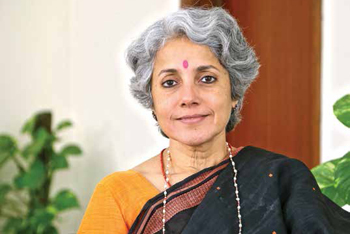
Soumya Swaminathan, first Indian at WHO’s top deck
The World Health Organisation (WHO) has elevated renowned paediatrician and clinical scientist, Soumya Swaminathan, to the post of Chief Scientist from her previous role as Deputy Director General (DDG) of WHO. This makes her the first Indian to hold one of the highest ranks in the WHO as she is set to occupy the second-highest position at the UN agency to be working under Tedros Adhanom Ghebreyesus, Director-General, WHO. She confirmed that, her role as Chief Scientist is a newly created position and division. As the Director-General Programmes (DDP), she was one of the three DDGs who assisted Ghebreyesus. The new position follows Ghebreyesus’s idea of ushering in reforms focussing on digital health and innovation at the WHO. Soumya is not new to research and scientific quest; being the daughter of a renowned geneticist, MS Swaminathan, who is regarded as the father of India’s Green Revolution. His role in developing high-yielding varieties of rice and wheat was actually the first trigger for Soumya in her childhood trips to her father’s lab and experimental wheat fields for instilling her passion in medical research. Amidst the breakout of the deadly coronavirus globally, she said that “Understanding the disease, its reservoirs, transmission and clinical severity and then developing effective counter-measures is critical for the control of the outbreak, to reduce deaths and minimise the economic impact.”
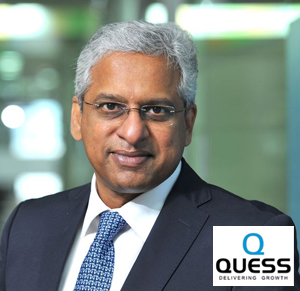 Ajit Isaac, Chairman & MD, Quess,
Ajit Isaac, Chairman & MD, Quess,Corp. Ltd.
Quess Surpasses TCS in employee numbers
Bengaluru based, Quess Corp has surpassed Tata Consultancy Services by becoming the largest private-sector employer with a growth rate of 38%. Since 2016, with 90,000 of its employees working overseas, its India work force base is at 3.6 lakh. However, this comparison stops at the skill set level as TCS is primarily an employer of white collared professionals, while Quess proliferates through its ‘grey collared’ workers. Quess has gained in the current economic shift which has resulted in the demand for outsourced workers in sectors such as e-commerce delivery, for facilities management for commercial buildings. With clientele such as Bajaj Finance, Amazon, and Samsung, the company has about 5,000 overseas workers in Singapore alone. “There are many countries which have a population smaller than the number of em-ployees we have. The scale of our impact on the Indian job market is not well-known, especially the role we play in formalising the job economy,” said Suraj Moraje, Group CEO (Designate) at Quess Corp. He said that the average salaries at Quess range between Rs.12,000-Rs.40,000 for 70% of its workforce, about 75% of whom are in the age group of 21-35. The firm interviews over one million people a year. Investors say the shift is happening because wages have increased substantially in the segment.
“Companies are focusing on their core activities, while outsourcing activities that can be done by a specialised company; Quess Corp fits in there. Companies are wary of employing full-time when they can find gigs to fill in the jobs,” said Mahesh Vyas, MD & CEO at CMIE (Centre for Monitoring Indian Economy). Quess, launched by serial entrepreneur Ajit Isaac, 10 year ago, has grown through a slew of acquisitions with backing from Fairfax, owned by Canadian billionaire Prem Watsa.
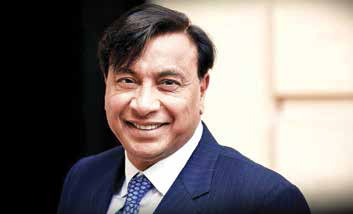
ArcelorMittal completes acquisition of Essar Steel
ArcelorMittal has completed its acquisition of now erstwhile Essar Steel India in partnership with Nippon Steel (AM/NS India) via an equity contribution of $1.6 billion, which the company described as its biggest achievement of 2019. ArcelorMittal said that “the acquisition of Essar formed a fifth steel pillar for it.” “Having completed the acquisition of Essar Steel India in partnership with Nippon Steel, we have also secured a new opportunity for the group in the fast-growing Indian market,” said Lakshmi Mittal, Chairman and CEO, ArcelorMittal. Arcelor holds 60% in the new entity AM/NS India, while the rest is vested with Nippon Steel. Arcelor and Nippon Steel are financing their venture AM/NS India, through a combination of 1/3rd partnership equity and 2/3rd thirds debt component. “2019 was a very tough year, clearly reflected in our significant-ly reduced profitability. However, our cash generation remained strong helping to reduce net debt to the lowest ever level, “ said Mittal. Arcelor’s revenues in 2019 were at $70.6 billion in comparison to $76 billion in the previous year. Its crude steel production stood at 89.8 million tonnes and own iron ore production at 57.1 million tonnes. Mittal added that despite challenging market conditions, they are looking up to the encouraging early signs of improvement in core markets of US, Europe and Brazil. “With inventory levels having reached a very low level following a period of de-stocking, we are seeing customers return to the market,” he said.
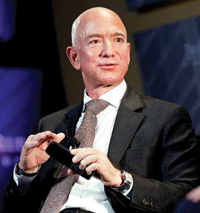
Amazon infuses another 2500 crore in India business
Following Amazon founder Jeff Bezos’s announcement to pump $1 billion investment into digitising small and medium enterprises (SMEs) in India, Amazon has infused over Rs.2,500 crore into two of its Indian businesses. According to regulatory filings, the board of Amazon Seller Services has allotted shares worth about Rs.2,208 crore to Amazon Corporate Holdings and Amazon.com Inc. The resolution was approved on January 24, 2020. Amazon had recently injected over Rs.1,700 crore into its payments and wholesale business units in India, that signalled an opportunity on Amazon’s India plans. Amazon Pay India had received Rs.1,355 crore, while Amazon Wholesale (India) allotted shares worth about Rs.360 crore. Meanwhile, India’s antitrust body, the Competition Commission of India has ordered an investigation into alleged violations of competition laws by Amazon and its rival, Walmart-owned Flipkart.
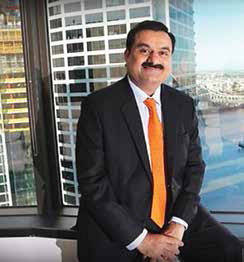
Adani Transmission raises $310 million via U.S. private placement
Adani Transmission Ltd (Gautam Adani Group unit) and India’s largest private sector power transmission company has raised $310 million in dollar-denominated debt via a private placement to US-based investors, as per stock exchange filings. “This USD denominated notes are raised by six-wholly owned subsidiaries of Adani Transmis-sion Ltd amounting to $310 million. The proposed US note placement, which will be fixed rate instrument, will mitigate interest rate risk for these companies,” the filing said. With the recent placement, Adani Transmission currently has a 30-year, 10-year and 17-year maturity debt paper in the market, it added “The placement is a strong endorsement of global investors’ confidence in Adani Transmission as a value creator and leader in the power sector contributing toward sustainable growth in the country,” said Anil Sardana, Managing Director and Chief Executive Officer, Adani Transmission. He added that the funds would enable the company in its efforts toward scaling infrastructure, improving electrification and bridging the gap between the supply and demand for power. Adani Transmission has a portfolio aggregating a transmission network of more than 14,800 circuit km, of which more than 11,470km is operational. This includes around 3,320km under various stages of construction.
Payu acquires PaySense
Digital payment gateway provider, PayU acquired a controlling stake with a deal valuation at $185 million in the Mumbai based consumer lending startup platform, PaySense. Plans are to merge PayU’s credit business, LazyPay in the joint unit as one of the nation’s largest payments processor. “The merger will help PayU solidify its presence in the credit business and become one of the largest players, said Siddhartha Jajodia, global head of Credit at PayU. “It’s the largest merger of its kind in India,” he said. According to Prashanth Ranganathan, founder and Chief Executive of PaySense, both PaySense and LazyPay will develop a common and shared technology infrastructure. “But, in the immediate future, LazyPay and PaySense will continue to be offered as separate services to consumers,” said Ranganathan. “Over time, as the businesses get closer, we will make a call if a consolidation of brands is required. But for now, we will let consumers direct us,” he said. The joint entity will score a valuation of $300 million with PaySense’s Prashanth Ranganathan, slated as the chief executive of the joint unit.
Sonal dabral resigns from ogilvy India
Sonal Dabral, has resigned from his role as Chief Creative Officer South & South East Asia and Vice-Chairman of its creative agency, Ogilvy India in his quest for exploring options in content management and content creation. He took over as Group Chief Creative Officer and Vice Chairman, Ogilvy in 2017, having moved from DDB Mudra whilst fulfilling a larger role in the APAC region since January 2019 for Ogilvy. With more than three decades of experience in advertising, Dabral is remembered for his creatives working with popular brands across various categories such as Volkswagen, Audi, Hindustan Unilever’s Dove trademark, Fevicol, Tata, AIG, Prudential, and Nestle’s Maggi noodles amongst others. He had previously worked with Ogilvy between 1991 to 1999, and later became the creative head of Ogilvy Malaysia and moved on to become the Chairman and Executive Creative Director of Ogilvy Singapore. “Sonal was one of my key partners in the creative renaissance at Ogilvy India in the early 1990s. He later moved on to do successful stints as the creative head of Ogilvy Malaysia and Singapore,” said Piyush Pandey, Chief Creative Officer, World-wide, and Executive Chairman, Ogilvy India.
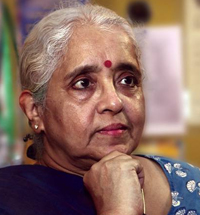
Mother of microfinance Vijayalaskhmi das, passes away
Mother of Indian microfinance, Vijayalaskhmi Das, passes away. The founder CEO of the Friends of Wom-en’s World Banking (FWWB), India, popular as “Viji” had come forward to handhold some of the biggest names in Indian microfinance in their initial days, the likes of SKS Microfinance (now Bharat Financial Services and part of IndusInd), Spandana or Share Microfin, among several others. FWWB - the Women’s World Bank-ing, focuses on giving women access to financial services. Under her regime, FWWB India, became the first lender to provide credit support to over 200 micro lending institu-tions across Ahmedabad, Andhra Pradesh, Tamil Nadu and Karnataka. A postgraduate in economics, she followed it up with advanced courses in economics from the Economic Institute, Harvard Institute for International Development and the Women’s World Banking, USA, and was on the board of several institutions.“For many in Indian microfinance and leaders in the financial inclusion space, it is like losing a kind-hearted mentor and mother, who put her faith in people rather than the balance sheet. She had played a crucial role in the evolution of this space in India,” said M S Sriram, a financial inclusion expert and professor at the IIM Bangalore.